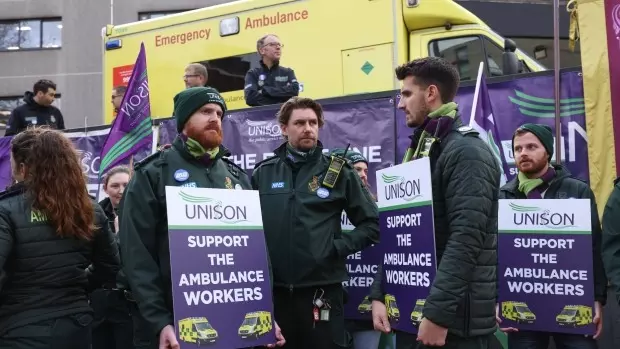London January 2023: The UK’s health system will endure another crisis Wednesday as ambulance workers hold a second strike and the public is warned they may have to wait longer than usual for emergency services.
Members of two unions, Unison and the GMB, are walking out as part of an ongoing row over real-terms pay cuts suffered by staff in the National Health Service. Meetings with ministers on Monday failed to produce a breakthrough.
“There will be fewer ambulances on the roads and fewer staff in our control rooms triaging 999 calls,” the London Ambulance Service said in a statement. “Patients may find it takes longer to get through to these services.”
The protests will affect much of England and Wales and follow a strike by ambulance workers in the run-up to Christmas — the first for three decades. Industrial action planned for Dec. 28 was called off. During the strikes people are told to only phone for an ambulance in a life-threatening situation.
With discontent sweeping the NHS, nurses are due to stage more strikes later in January while junior doctors and physiotherapists are also planning industrial action.
Business Secretary Grant Shapps introduced anti-strike legislation to the House of Commons on Tuesday as the UK government tries to minimize disruption from industrial action across a number of sectors.
Under the proposed law, minimum service levels would be required on strike days for fire, ambulance and rail services, with the government consulting on the adequate level of coverage. In a string of broadcast interviews on Tuesday, Shapps said Britain was following the example set by other European nations, including France and Germany.
“We will never withdraw the right to strike from people but when there are strikes on, life and limb must come first and there has to be a minimum safety standard put in place for that,” Shapps told GB News before delivering a statement in the Commons about the legislation.
Unions criticized the proposals, with Mick Lynch, general secretary of the National Union of Rail, Maritime and Transport Workers, calling them “an attack on human rights and civil liberties,” and the Trades Union Congress vowing to fight them “every step of the way.”
With teachers and doctors also threatening to join the wave of strikes, ministers on Monday held talks with unions across a range of sectors. They failed to stem planned strikes, although the government stance in opposition to the pay demands of health care workers appeared to have softened, with Health Secretary Steve Barclay telling union officials he was open to backdating their next pay rise.
Backdated Pay
The government has so far refused to countenance re-opening public sector pay rises for the current tax year, saying ministers have followed in full the recommendations of independent pay review bodies. But the unions have also stood firm, saying extra pay for this year is a key demand. The backdating proposal could be a creative workaround, allowing all sides to say they haven’t compromised on their principles.
Asked whether the Treasury would be open to a request from Barclay for backdated extra pay for healthcare workers, Prime Minister Rishi Sunak’s spokesman, Max Blain, declined to comment Tuesday, saying he wouldn’t be drawn on conversations that take place between government departments.
The legislation put forward by Shapps also covers healthcare, education, nuclear decommissioning, border security and other modes of transport, but those sectors will be subject to voluntary agreements on minimum service levels, the government said last week.
“We hope to reach minimum service agreements so that we do not have to use the powers,” Shapps told the Commons.
The legislation would allow employers to fire striking workers in essential sectors and sue trade unions if they fail to provide a minimum level of service, a person familiar with the matter told Bloomberg last week.
Labour’s Promise
While Shapps estimates the bill will takes less than six months to pass, it will face stiff opposition from the unions and the Labour Party — whose leader Keir Starmer has vowed to repeal it if passed. The Trade Unions Congress on Tuesday called on lawmakers to reject what it dubbed the “sack key workers bill.”
“If passed, this bill will prolong disputes and poison industrial relations – leading to more frequent strikes,” TUC General Secretary Paul Nowak said in a statement. “This legislation would mean that when workers democratically vote to strike, they can be forced to work and sacked if they don’t comply. That’s undemocratic, unworkable, and almost certainly illegal.”
After a meeting of union chiefs on Tuesday, the TUC said it will hold a “protect the right to strike” day on Feb. 1 with events around the country inviting the public to show their support for labor rights. Nevertheless, the response fell short of a co-ordinated strike across multiple unions, a prospect which had been mooted ahead of the meeting.
Shapps told Times Radio that “every other European country has some form of minimum safety in place,” and that the government wants “to make sure we’re doing the same thing to protect the British people.”
His department last week said that the Netherlands, Germany, Spain and France “all balance the right to strike with ensuring continuity of public services,” and that UK provisions won’t go as far as some countries, “who ban outright strikes in ambulance and fire service.”










